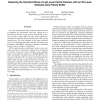26 search results - page 4 / 6 » Cache-Line Decay: A Mechanism to Reduce Cache Leakage Power |
MICRO
2008
IEEE
14 years 1 months ago
2008
IEEE
It is well recognized that LRU cache-line replacement can be ineffective for applications with large working sets or non-localized memory access patterns. Specifically, in lastle...
CF
2007
ACM
2007
ACM
Adaptive VP decay: making value predictors leakage-efficient designs for high performance processors
13 years 11 months ago
Energy-efficient microprocessor designs are one of the major concerns in both high performance and embedded processor domains. Furthermore, as process technology advances toward d...
TC
2008
13 years 7 months ago
2008
This paper describes a new on-demand wake-up prediction policy for reducing leakage power. The key insight is that branch prediction can be used to selectively wake up only the nee...
CASES
2006
ACM
14 years 1 months ago
2006
ACM
Virtual caches are employed as L1 caches of both high performance and embedded processors to meet their short latency requirements. However, they also introduce the synonym proble...
MICRO
2002
IEEE
13 years 7 months ago
2002
IEEE
On-chip caches represent a sizeable fraction of the total power consumption of microprocessors. Although large caches can significantly improve performance, they have the potentia...

